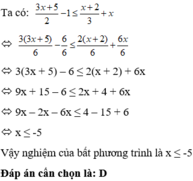Bất phương tình 3 x + 5 2 − 1 ≤ x + 2 3 + x có nghiệm là
A. Vô nghiệm
B. x ≥ 4,11
C. Vô số nghiệm
D. x ≤ -5
Hãy nhập câu hỏi của bạn vào đây, nếu là tài khoản VIP, bạn sẽ được ưu tiên trả lời.



Đáp án: D
2 - x = x nên x > 0 kết hợp đkxđ x ≤ 2 khi đó phương trình có nghiệm thỏa mãn 0 < x ≤ 2 ⇒ a sai.
7 - 4 3 = 2 - 3 . ⇒ b sai
2 x - 1 x - 2 = x + 1 x - 2 ⇒ 2x – 1 = x + 1 ( x ≠ 2 ) ⇔ x = 2 (loại).
Vậy phương trình vô nghiệm. ⇒ c đúng.
5 x 2 - 4 5 x + 3 < - 1 ⇔ 5 x 2 - 4 5 x + 4 < 0 ⇔ 5 x - 2 2 < 0 (vô lí) ⇒ d sai.
có 1 mệnh đề đúng.

32+1123+ \(x = {-b \pm \sqrt{b^2-4ac} \over 2a}gfdrrffhjxxojmu09\)

a.
Pt có 2 nghiệm pb khi:
\(\left\{{}\begin{matrix}m+1\ne0\\\Delta'=\left(m+3\right)^2-\left(m+1\right)\left(-m+2\right)>0\end{matrix}\right.\)
\(\Leftrightarrow\left\{{}\begin{matrix}m\ne-1\\2m^2+7m+7>0\left(\text{luôn đúng}\right)\end{matrix}\right.\)
\(\Rightarrow m\ne-1\)
b.
BPT vô nghiệm khi \(\left(m^2-4m-5\right)x^2+2\left(m-5\right)-1< 0\) nghiệm đúng với mọi x
- Với \(m=-1\) ko thỏa mãn
- Với \(m=5\) thỏa mãn
- Với \(m\ne\left\{-1;5\right\}\)
\(\Rightarrow\left\{{}\begin{matrix}m^2-4m-5< 0\\\Delta'=\left(m-5\right)^2+m^2-4m-5< 0\end{matrix}\right.\)
\(\Leftrightarrow\left\{{}\begin{matrix}-1< m< 5\\\left(m-5\right)\left(2m-4\right)< 0\end{matrix}\right.\)
\(\Leftrightarrow\left\{{}\begin{matrix}-1< m< 5\\2< m< 5\end{matrix}\right.\) \(\Rightarrow2< m< 5\)
Kết hợp lại ta được: \(2< m\le5\)

a) Thay m=3 vào pt ta được:
\(9x+6=4x+9\Leftrightarrow x=\dfrac{3}{5}\)
Vậy...
b) Thay x=-1,5 vào pt ta được:
\(m^2\left(-1,5\right)+6=4.\left(-1,5\right)+3m\)
\(\Leftrightarrow\dfrac{-3}{2}m^2-3m+12=0\)\(\Leftrightarrow\left[{}\begin{matrix}m=2\\m=-4\end{matrix}\right.\)
Vậy...
c)Pt \(\Leftrightarrow x\left(m^2-4\right)=3m-6\)
Để pt vô nghiệm \(\Leftrightarrow\left\{{}\begin{matrix}3m-6\ne0\\m^2-4=0\end{matrix}\right.\)\(\Leftrightarrow\left\{{}\begin{matrix}m\ne2\\m=\pm2\end{matrix}\right.\)\(\Rightarrow m=-2\)
Để pt có vô số nghiệm \(\Leftrightarrow\left\{{}\begin{matrix}3m-6=0\\m^2-4=0\end{matrix}\right.\)\(\Leftrightarrow\left\{{}\begin{matrix}m=2\\m=\pm2\end{matrix}\right.\)\(\Rightarrow m=2\)
d)Để pt có nghiệm \(\Leftrightarrow m^2-4\ne0\Leftrightarrow m\ne\pm2\)
\(\Rightarrow x=\dfrac{3m-6}{m^2-4}=\dfrac{3\left(m-2\right)}{\left(m-2\right)\left(m+2\right)}=\dfrac{3}{m+2}\)
Để \(x\in Z\Leftrightarrow\dfrac{3}{m+2}\in Z\)
Vì \(m\in Z\Leftrightarrow m+2\in Z\).Để \(\dfrac{3}{m+2}\in Z\Leftrightarrow m+2\inƯ\left(3\right)=\left\{-1;-3;1;3\right\}\)
\(\Leftrightarrow m=\left\{-3;-5;-1;1\right\}\) (tm)
Vậy...

a. để phương trình nhận x=3 là nghiệm ta có
\(a\left(3+2\right)-a^2-2=0\Leftrightarrow a^2-5a+2=0\Leftrightarrow a=\frac{5\pm\sqrt{17}}{2}\)
b. Để phương trình có duy nhất 1 nghiệm âm ta có :
\(\hept{\begin{cases}a\ne0\\x=\frac{a^2-2a+2}{a}< 0\end{cases}\Leftrightarrow a< 0}\) do \(a^2-2a+2>0\forall a\)
c. Để phương trình đã cho vô nghiệm thì a=0
d. Phương trình đã cho không thể có vô số nghiệm thực.

a) Thay x=3 vào phương trình ta có:
(m+2)3-5=4
<=> 3m+6-5-4=0
<=> 3m-3=0
<=> m=1
Vậy phương trình có nghiệm x=3 khi m=

a.
Khi \(m=2\) pt trở thành:
\(2x+3=0\Rightarrow x=-\dfrac{3}{2}\)
b.
Để pt có nghiệm \(x=-1\)
\(\Rightarrow\left(m^2-m\right).\left(-1\right)+m^2-1=0\)
\(\Leftrightarrow-m^2+m+m^2-1=0\)
\(\Leftrightarrow m-1=0\)
\(\Leftrightarrow m=1\)
c.
Pt tương đương:
\(\left(m^2-m\right)x=-\left(m^2-1\right)\)
\(\Leftrightarrow m\left(m-1\right)x=-\left(m-1\right)\left(m+1\right)\)
Pt vô nghiệm khi:
\(\left\{{}\begin{matrix}m\left(m-1\right)=0\\-\left(m-1\right)\left(m+1\right)\ne0\end{matrix}\right.\) \(\Leftrightarrow m=0\)
\(\Rightarrow\) pt có nghiệm khi \(m\ne0\)
Pt có vô số nghiệm khi:
\(\left\{{}\begin{matrix}m\left(m-1\right)=0\\-\left(m-1\right)\left(m+1\right)=0\end{matrix}\right.\) \(\Leftrightarrow m=1\)
Lời giải:
a. Khi $m=2$ thì pt trở thành:
$2x+3=0\Leftrightarrow x=-\frac{3}{2}$
b. Để pt có nghiệm $x=-1$ thì:
$(m^2-m).(-1)+m^2-1=0$
$\Leftrightarrow m-1=0\Leftrightarrow m=1$
c.
PT $\Leftrightarrow (m^2-m)x=1-m^2$
Để pt vô nghiệm thì: \(\left\{\begin{matrix} m^2-m=0\\ 1-m^2\neq 0\end{matrix}\right.\Leftrightarrow \left\{\begin{matrix} m(m-1)=0\\ (1-m)(1+m)\neq 0\end{matrix}\right.\)
\(\Leftrightarrow m=0\)
PT có vô số nghiệm khi \(\left\{\begin{matrix} m^2-m=0\\ 1-m^2= 0\end{matrix}\right.\Leftrightarrow m=1\)
Để PT có nghiệm thì: $m\neq 0$